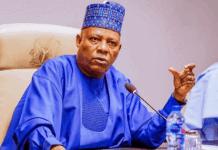The Socio-Economic Rights and Accountability Project has sent a complaint to the World Bank Inspection Panel urging the panel “to probe allegations of corruption in the spending of the loans and other funding facilities obtained by the Federal Government and Nigeria’s 36 state governors and to review the implementation of all Bank-funded projects by successive governments since 1999.”
SERAP maintained that despite money loaned to Nigeria by the World Bank over the decades, many citizens are still living in poverty and hardship till date.
SERAP urged the Inspection Panel “to determine the extent to which the bank management has followed or is following the World Bank’s operational policies and procedures applicable to the design, appraisal and implementation of all bank-financed projects in Nigeria.”
SERAP also urged the panel “to determine the effect of any failure by the bank management to effectively implement its operational policies and procedures in all bank-funded projects in several states on the social and economic rights and well-being of millions of socially and economically vulnerable Nigerians.”
SERAP’s complaint followed the Debt Management Office’s report last week, that Nigeria’s total public debt stock, including external and domestic debts, increased by N24.33tn in three months alone, from N97.34tn ($108.23bn) in December 2023 to N121.67tn ($91.46bn) as of March 31, 2024.
The DMO disclosed the new figure in a press release on Thursday in Abuja.
The public debt, comprise of Total Domestic and External Debts of the Federal Government, the 36 state governments, and the Federal Capital Territory.
In a letter on Saturday, signed by SERAP’s deputy director, Kolawole Oluwadare, the organisation said, “The World Bank has over the years reportedly approved 197 projects for Nigeria, totalling over $36bn in loans and other funding facilities (that is, $36,360,415,968.81), with little or no impact on Nigerians living in poverty.”
SERAP said, “Nigerians are rarely informed and meaningfully and effectively consulted about several of these loans, facilities and bank-funded projects. Nigerians continue to be denied the benefits of the loans and facilities and access to basic public goods and services.”
According to SERAP, “Despite several loans and other funding facilities provided by the World Bank over many years, millions of socially and economically vulnerable Nigerians in several states and communities continue to lack access to regular electricity supply and have denied the benefit of renewable energy solutions.”
The complaint, addressed to the Chair of the Panel, read in part: “A recent report by the National Bureau of Statistics revealed that over 133 million Nigerians are living in poverty, the majority of them women and children. We would therefore be grateful if the recommended measures are taken to hold the World Bank to account.
“The apparent failure by Bank Management to diligently follow the World Bank’s operational policies and procedures in Bank-funded projects have resulted in the alleged mismanagement of the loans and facilities and exposed millions of Nigerians to extreme poverty.
“We are concerned about the negative impact of the lack of transparency and accountability in the spending of loans and facilities obtained by the Federal Government and Nigeria’s 36 state governors on the social and economic well-being of millions of Nigerians and the enjoyment of their human rights.
“We are concerned that several of Nigeria’s 36 states and the FCT reportedly owe civil servants’ salaries and pensions. Several states are borrowing to pay salaries. Millions of Nigerians resident in these states and the FCT continue to be denied access to basic public goods and services.”
SERAP said the FG and several states were also reportedly spending public funds which may include the loans and facilities obtained from the World Bank to fund “unnecessary travels, buy exotic and bulletproof cars and generally fund the lavish lifestyles of politicians.”
The organisation stated that “The Bank recently approved a $2.25bn loan for Nigeria ‘to shore up revenue and support economic reforms and address cost-of-living crisis in the country.’
It added, “In September 2002, the Bank approved $129m for a project titled ‘Universal Basic Education Project: P071494’ ‘to increase the capacity of states and local governments to manage and implement the UBE program effectively and efficiently.
“In May, 2007 the Bank approved $180m for a project titled ‘Nigeria Federal Science & Technical Education at Post-Basic Levels (STEPB): P074132’, ‘to produce more and better qualified science and technology graduates.’”
In May 2000, the Bank approved $55m for a project titled ‘Second Primary Education Project: P066571’, ‘to support the implementation of Universal Basic Education.’”
Listing the loans up till 2022, SERAP said many years of allegations of corruption and mismanagement of public funds including the spending of the loans and facilities obtained by the FG and the 36 states had contributed to widespread poverty, underdevelopment and lack of access to public goods and services in the country.
“The Bank has apparently failed and/or neglected to effectively apply its various operational policies and procedures to ensure the transparent and accountable spending of its 197 loans and facilities across several states in the country,” the statement added.

























